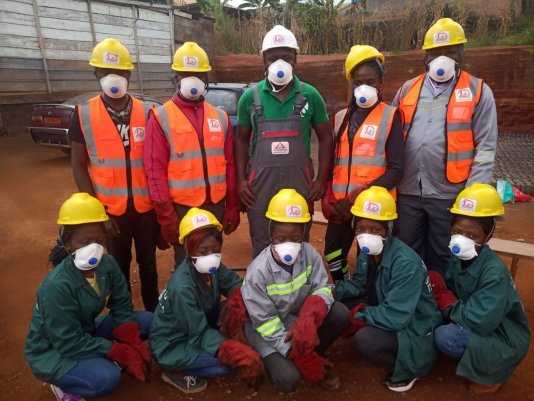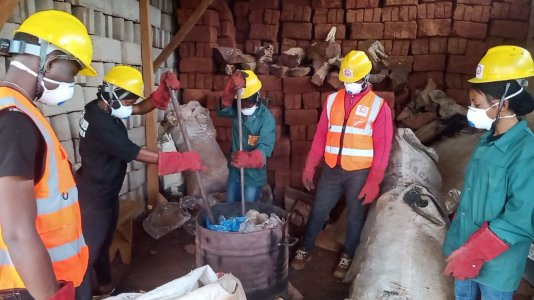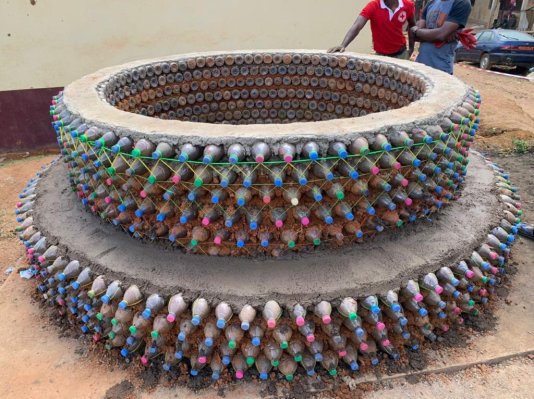- About
- Topics
- Picks
- Audio
- Story
- In-Depth
- Opinion
- News
- Donate
-
Signup for our newsletterOur Editors' Best Picks.Send
Read, Debate: Engage.
| October 10, 2022 | |
|---|---|
| topic: | Sustainable Development |
| tags: | #Cameroon, #Sustainable Development, #flood, #green building, #plastic pollution, #recycling |
| located: | Cameroon |
| by: | Isaac Genna Forchie |
It is morning in the New Town neighbourhood in Mbalmayo, a peripheral town in central Cameroon. Bright sun rays beam through the far left window of a newly constructed classroom where third grade students of a public primary school are taking lessons in a building of their own for the first time since it was established some five years ago.
But the presence of hundreds of adults leaves the kids anxious, as it suggests something big is happening: The first classroom constructed by a combination of plastic containers, sand and soil was about to be inaugurated.
Just next to the adorned structure stands Ahmed Moumine, 24, founder Think Green - a non-governmental organisation that built the 'plastic building' in collaboration with the Mbalmayo council and another NGO.
"With our engagement in the fight against plastic pollution, we wondered how we could bring some significant impact," Moumine told FairPlanet.
In addition to the classroom, which was built on a 100 square-meter piece of land, "we used plastic waste to construct a water tank with a capacity of 3,400 liters, and a toilet," he added.
"We initiated this project after we got in touch with Andreas Froese, a German engineer who has been doing construction with plastic bottles for years."
For six weeks, Think Green reportedly collected some 15,000 plastic bottles from the area, a feat appreciated by the mayor of Mbalmayo, Dieudonne Zang Mba Obele. "We do not only have a classroom, but our streets are also cleaner, and gutters clearer," he stated.
According to the United Nations Environment Programme, every minute one million plastic bottles are sold in the world. While as many as 500 billion are discarded into the environment annually, with just nine percent of them recycled, posing a severe threat to biodiversity.
For the procedure, Moumine said, his NGO "[collected] plastic bottles as an environmental group," and "[sieved] the soil to render it more uniform and compact."
The team, which he said is made up of bricklayers and engineers, would then proceed to fill the soil and/or sand into plastic bottles, which would serve as building blocks. The rest of the process follows all building norms and procedures, he indicated.
While some civil engineers remain reserved about this innovation, citing insufficient research, its promoters claim their work is sustainable. They reference Andreas Froese, the author of Eco-Tec, a movement that championed the construction of ecological houses in Latin America and across the globe. They draw specific attention to Froese's 20-plus-year-old building in Honduras, which they say is still in good shape.
"We are simply readapting the building to address a problem of plastic waste and climate change - respecting engineering norms," Moumine said, adding that their final product has been tested and validated by the public works laboratory at the University of Bamenda in Cameroon.
Having attained his NGO's objective in Mbalmayo, Moumine said they are open for new partnerships across Cameroon and central Africa.
Elvis Chiangwa, a United Kingdom-based civil engineer, believes that, if well compacted, bricks made of plastics can be stronger. "It has been proven that when well-compressed plastic bricks are stronger than some cement bricks," the engineer told FairPlanet.
"The durability will depend on the plastic type and the quantity that is used in the production of these bricks," Chiangwa added.
However, he suggests that more research is needed in order to determine scientific formulae that would allow this method to be scaled.
"This could not be achieved without the input of the community," Moumine said. "Even prisoners in the town played an active role, as they went searching for plastic bottles."
The project evidently generated some income for members of the community. "Our aim is to change lives, impact lives, ensure unity and create jobs in the community," Moumine added.
Meanwhile, it appears that this building method is gaining steam in the Central African country, with a focus on communities' wellbeing and development.
Poverty is at the core of some of Cameroon's inter-communal clashes, and particularly squirmished over land for farming and grazing. The latest incident was the August 2021 clash between Shuwa Arabs and Musgoums in northern Cameroon. At least 30 people were killed and 47,000 others were affected.
In a bid to create more jobs and to restore hope to the Lake Chad basin area, which had also been battered by Boko Haram, the government of Cameroon has initiated a World Bank-funded development project with a component to produce pavement blocks from plastic waste.
The Lake Chad Region Recovery and Development Project, which is set to be implemented in the northern Cameroonian city of Kousseri, strives to support victims of attacks carried out by the Islamist militia.
Abicho Mahamat, who manages the programme, said they have already engaged on a procedure to contract a specialised organisation which is expected to set up a plant that will produce pavement stones from plastic waste.
Targeted youths will learn techniques of collecting and transforming plastic waste into environmentally-friendly paving stones.
Mahamat claims that the project will withdraw a significant amount of plastic waste from around the lake and cut down on carbon production by 32 percent by 2030.
In western Cameroon, Pierre Sunday’s Legacy CACOMEYU Group Ltd is melting disposable plastic containers and other waste and pours the hot fluid, along with some sand, into special molds to form pavement blocks. Sunday's company doesn't use a single gram of clinker or cement, whose prices have spiked.
Sunday, 40, says this is his modest way of supporting the fight against climate change and addressing the reverberating effects of the war in Ukraine. So far , he has trained some 98 youths, including two of his three kids, and has utilised some 1,020 kg of plastic waste in Cameroon.
"Our bricks have been tested by an engineering laboratory at the University of Bamenda, and confirmed to be 100 times more resistant over those made of cement," Sunday told FairPlant.
"After sorting the waste supplied to us by young guys, we melt it and then take up the required sand," Sunday said. "We only use sharp sand, and the melted plastic serves as a binding force.
"We mix the fluid in proportion to the gravel. Then we fill it in the molds and allow them to cool down."
Once at room temperature, they extract the molds to free up the blocks. The team is now securing installations to go mechanical, as they look to produce and market in bulk.
Sunday said that one square meter will cost FCFA 12,000 (roughly USD $19.5). Their long term ambition is to fabricate all input items needed to construct houses in Cameroon.
It should be mentioned that the official price set by the Cameroonian government for 50kg of cement remains in the neighbourhood of FCFA 5,000 (about $8.1), and sells for higher amounts in peripheral areas. In other land locked countries in central Africa, a bag occasionally sells at FCFA 11,000 (roughly $18).
Cameroonian Environmental Engineer, Ismael Essome Ebone, claims that the domino effect of plastic wastes is severe. "Floods are made worse by plastic wastes," he stated. The engineer indicated that fishing waters have been ravaged by plastic waste.
Government efforts to clear the waste gain steam during special events, but often fade out quicker than anticipated. The African Development Bank (AfDB) on 20 September signed to provide FCFA 15 billion ($22,900) to improve the drainage system in Cameroon's capital Yaounde, where plastic waste triggers most floods.
In an effort to maintain homologated prices, Cameroon has in the last six months held at least six meetings with cement dealers who have raised concerns over the increasing cost of production.
Africa’s major cement producer, Dangote, opted for a new brand in order to survive the rising costs of production. The producer confirmed it lost FCFA 15 billion ($22,900) in 2021.
"We introduced 32.5-grade cement - different from 42.5 which is the company's reference product, to reduce the volume of clinker used," Emmanuel Ngando, Dangote’s marketing manager for Cameroon, said after holding talks with government officials recently.
Think Green members see this as a validation of their vision to seek innovative solutions, hinting that the high cost of conventional cement provides an incentive for builders to adopt "less expensive" plastic material.
Image by Ahmed Moumine.



By copying the embed code below, you agree to adhere to our republishing guidelines.
